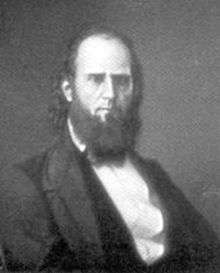John J. Pettus
| John J. Pettus | |
|---|---|
 | |
| 23rd Governor of Mississippi | |
|
In office November 21, 1859 – November 16, 1863 | |
| Preceded by | William McWillie |
| Succeeded by | Charles Clark |
| 20th Governor of Mississippi | |
|
In office January 5, 1854 – January 10, 1854 | |
| Preceded by | Henry S. Foote |
| Succeeded by | John J. McRae |
| Personal details | |
| Born |
John Jones Pettus October 9, 1813 Wilson County, Tennessee, US |
| Died |
January 28, 1867 (aged 53) Pulaski County, Arkansas |
| Political party | Democratic |
John Jones Pettus (October 9, 1813 – January 28, 1867) was a United States politician. Born in Wilson County, Tennessee, he was the governor of the state of Mississippi from January 5, 1854 to January 10, 1854, the shortest term of governor in the state’s history.[1] Pettus was later elected to a full term and served from 21 November 1859 - 16 November 1863 during which time he took Mississippi out of the Union.[1] Pettus was a member of the Democratic party.
Personal life
Pettus was born in Tennessee, but his family moved to Kemper County, Mississippi while he was a child.[1] His brother, Edmund Winston Pettus (1821–1907), would become a United States senator from Alabama. On April 4, 1837, he married his cousin, Permelia Virginia Winston, a daughter of William Winston and Mary Cooper, in Tuscumbia, Alabam.
Early political life
In 1846, Pettus represented Kemper County in the Mississippi House of Representatives. In 1848, he was then elected to the Mississippi State Senate and was named President of the Senate in 1854.[1]
Term as interim governor
In 1853, while lame-duck Governor Henry S. Foote was waiting for the January 11 inauguration of John J. McRae, Foote grew bitter and angry, addressing the legislative session by announcing that he had considered resigning in protest once the election results came in.[2] At noon at January 5, 1854, Foote's resignation was received by the state senate.[3]
The Mississippi Constitution of 1832 had abolished the office of lieutenant governor. Pettus, as President of the State Senate, was next in seniority and was sworn at noon on January 7, 1854.[3] Pettus held the governorship until McRae was sworn in on January 10, 1854.[4] His only record act during these 120 hours was to order a special session in Noxubee County to fill the office of a deceased state representative, Francis M. Irby.[3] On January 11, McRae was inaugurated as Governor and Pettus returned as senate president.[3]
During the 1850s, he became identified as "the Mississippi Fire-eater," a term referring to southerns supporting secession,[1]
Governorship
In 1859, he was elected Governor. In his inaugural address, he said that the south's only way to maintain slavery was secession and called for the establishment of a southern confederacy.[1] Following President Abraham Lincoln's election, on November 26, 1860, Pettus called for a Special Session of the Legislature and urges the Legislature to call for a convention to withdraw Mississippi from the Union.[5]
The Legislature called for a Secession Convention which convened in Jackson on January 7, 1861.[6] They voted succession and on January 9, 1861, Mississippi seceded from the Union. On February 4, 1861, along with five other slave states, the Confederate States of America was established at Montgomery, Alabama.[1] Pettus was re-elected in the fall of 1861.[4]
Post-governorship
Pettus was succeeded by General Charles Clark.[7] When his second term expired in October 1863, Pettus joined the Confederate Army.[1][4] Although General Robert E. Lee had surrendered at Appomattox, Pettus refused to surrender and became a fugitive.[1] His family later claimed he was planning to go to flee to Mexico with Jefferson Davis but Davis was captured before they could meet.[8] The manhunt for him continued until his death in Pulaski County, Arkansas on January 28, 1867.[1]
His original interment was in a private or family graveyard (on the property of a cousin, John Jones), but he was later re-interred at Flat Bayou Burial Ground in Wabbaseka, Arkansas.[9] His wife Permelia died in 1857 and is buried in the Winston Family Cemetery in Gainesville, Sumter County, Alabama.
References
- 1 2 3 4 5 6 7 8 9 10 Sansing, David G. (December 2003). "John Jones Pettus: Twentieth and Twenty-third Governor of Mississippi: January 5, 1854 to January 10, 1854; 1859-1863". Mississippi Historical Society. Retrieved 2014-06-07.
- ↑ Dubay, Robert W. (1975). John Jones Pettus, Mississippi fire-eater. Univ. Press of Mississippi. p. 16. ISBN 9781617033537.
- 1 2 3 4 Dubay, Robert W. (1975). John Jones Pettus, Mississippi fire-eater. Univ. Press of Mississippi. p. 17. ISBN 9781617033537.
- 1 2 3 "Mississippi Governor John Jones Pettus". National Governor's Association. Retrieved 8 June 2014.
- ↑ Mississippi. Dept. of Archives and History (1904). The Official and Statistical Register of the State of Mississippi. p. 128. Retrieved 8 June 2014.
- ↑ Lowry, Robert; McCardle, William H. (1891). A History of Mississippi: From the Discovery of the Great River by Hernando DeSoto, Including the Earliest Settlement Made by the French Under Iberville, to the Death of Jefferson Davis [1541-1889]. Mississippi: R.H. Henry & Company. p. 341. Retrieved 8 June 2014.
- ↑ Lowry, Robert; McCardle, William H. (1891). A History of Mississippi: From the Discovery of the Great River by Hernando DeSoto, Including the Earliest Settlement Made by the French Under Iberville, to the Death of Jefferson Davis [1541-1889]. Mississippi: R.H. Henry & Company. p. 349. Retrieved 8 June 2014.
- ↑ Smith, Timothy B. (2010). Mississippi in the Civil War: The Home Front (Volume 4 of Heritage of Mississippi ed.). Univ. Press of Mississippi. p. 49. ISBN 1604734302. Retrieved 8 June 2014.
- ↑ John J. Pettus at Find a Grave
External links
| Political offices | ||
|---|---|---|
| Preceded by Henry S. Foote |
Governor of Mississippi 1854 |
Succeeded by John J. McRae |
| Preceded by William McWillie |
Governor of Mississippi 1859-1863 |
Succeeded by Charles Clark |
|
